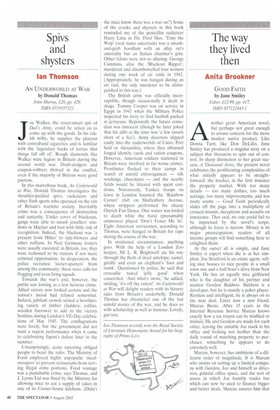Spivs and shysters
Ian Thomson
AN UNDERWORLD AT WAR by Donald Thomas John Murray, £20, pp. 429, ISBN 0719557321 Jroe Walker, the street-smart spiv of Dad's Amy, could be relied on to come up with the goods. In his rakish trilby, he supplies the platoon with contraband cigarettes and is familiar with the 'legendary backs of lorries that things fall off of'. Rough diamonds like Walker were legion in Britain during the second world war. Draft-dodgers and coupon-robbers thrived in the conflict, even if the majority of Britons were good patriots.
In this marvellous book, An Underworld at War, Donald Thomas investigates the shoulder-padded spivs, racketeers and other flash sports who operated on the rim of Britain's wartime society. Inevitably crime was a consequence of destruction and austerity_ Under cover of blackouts, gangs were able to smash jewellers' windows in Mayfair and loot with little risk of recognition. Indeed, the blackout was 'a present from Hitler' to safe-blowers and other ruffians. In Nazi Germany looters were usually executed; in Britain, too, they were reckoned to be traitors if not mere criminal opportunists. In desperation, the police recruited looter-spotters' from among the community; there were calls for flogging and even firing squads.
Towards the war's end, however, the public saw looting as a less heinous crime. Allied victory now looked certain and the nation's mood had relaxed somewhat. Indeed, jubilant crowds seized a bewildering varietyof timber (ladders, coffins, wooden barrows) to add to the victory bonfires during London's VE-Day celebrations of May 1945. The conflagrations were lovely, but the government did not want a repeat performance when it came to celebrating Japan's defeat later in the summer.
Unsurprisingly, acute rationing obliged people to bend the rules. The Ministry of Food employed highly unpopular 'mealsnoopers' to prevent restaurants from serving illegal extra portions. Food wastage was a punishable crime, says Thomas, and J. Lyons Ltd was fined by the Ministry for allowing mice to eat a supply of cakes in one of its Corner-house kitchens. (Didn't the mice know there was a war on?) Some of the crooks and shysters in this book reminded me of the penicillin racketeer Harry Lime in The Third Man. 'Tony the Wop' (real name uncertain) was a smashand-grab hoodlum with an alley rat's amorality but an Italian charmer's grin. Other felons were not so alluring. George Cummins, alias the 'Blackout Ripper', murdered and disembowelled four women during one week of air raids in 1942. (Appropriately, he was hanged during an air raid, the only murderer to be distinguished in this way.)
The British army was officially incorruptible, though occasionally it dealt in drugs. Tommy Cooper was on service in Egypt in 1941 when the Military Police inspected his lorry to find hashish packed in jerrycans. Reportedly the future comedian was innocent (though he later joked that his alibi at the time was 'a few tassels short of a fez'). Army deserters slipped easily into the underworlds of Cairo, Port Said or Alexandria, where they obtained forged identity cards and ration coupons. However. American soldiers stationed in Britain were involved in far worse crimes. Prostitutes flocked to their camps in search of untold extravagances — silk stockings, chocolates — and the nearby fields would be littered with spent condoms. Notoriously, Yankee troops on leave in London haunted the 'Rainbow Corner' club on Shaftesbury Avenue, where strippers performed the cheesy Ostrich Fan Dance. One waiter was knifed to death while the band (presumably unawares) played 'Don't Fence Me In'. Eight American servicemen, according to Thomas, were hanged in Britain for rape during the course of the war.
In straitened circumstances, anything goes. With the help of a London Zoo keeper, Mr L. R. Brightwell ate his way through the flesh of dead antelope, camel, giraffe and even an elephant's 'foot and trunk'. Questioned by police, he said that crocodile tasted 'jolly good' when casseroled. 'And what's more,' he added, smiling, 'it's off the ration!' An Underworld at War will delight readers with its bizarre tales from Britain's underbelly. Donald Thomas has chronicled one of the last untold stories of the war, and he does so with scholarship as well as humour. Lovely, guv'nor.
Ian Thomson recently won the Royal Society of Literature Heinemann Award for his biography of Primo Levi.


































































 Previous page
Previous page